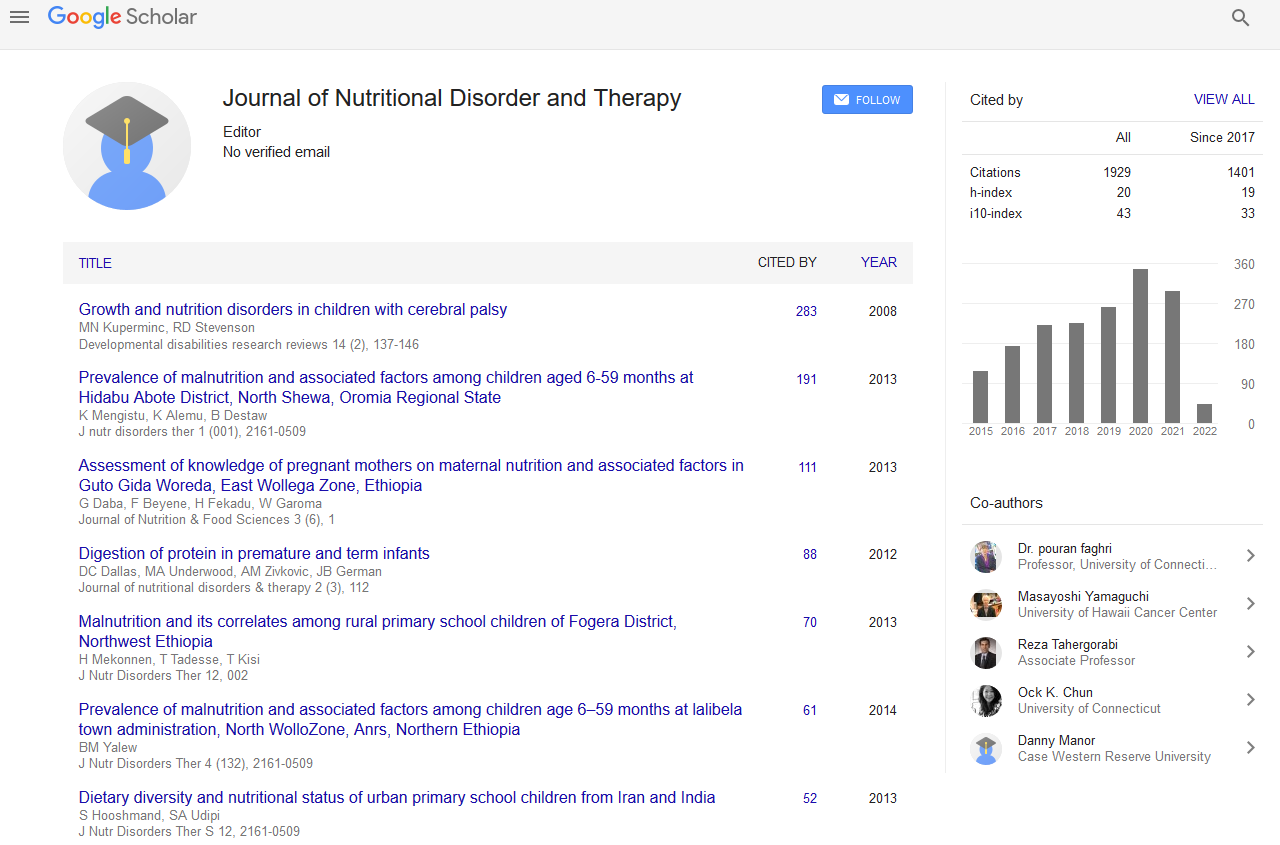Indexed In
- Open J Gate
- Genamics JournalSeek
- Academic Keys
- JournalTOCs
- Ulrich's Periodicals Directory
- RefSeek
- Hamdard University
- EBSCO A-Z
- OCLC- WorldCat
- Publons
- Geneva Foundation for Medical Education and Research
- Euro Pub
Useful Links
Share This Page
Journal Flyer

Open Access Journals
- Agri and Aquaculture
- Biochemistry
- Bioinformatics & Systems Biology
- Business & Management
- Chemistry
- Clinical Sciences
- Engineering
- Food & Nutrition
- General Science
- Genetics & Molecular Biology
- Immunology & Microbiology
- Medical Sciences
- Neuroscience & Psychology
- Nursing & Health Care
- Pharmaceutical Sciences
Understanding obesity among women in Erbil, the autonomous region of Kurdistan, Iraq using nutritional indicators and geographic data
JOINT EVENT: 13th International Congress on Advances in Natural Medicines Nutraceuticals & Neurocognition & 14th International Conference on Clinical Nutrition
July 27-29, 2017 Rome, Italy
Lisa Pawloski, Kevin Curtin, Taban Rasheed, Hamdia Ahmad and Arshi Moktader
George Mason University, USA
University of Salahaddin, Iraq
Hawler Medical University, Iraq
Scientific Tracks Abstracts: J Nutr Disorders Ther
Abstract:
Public health challenges in low-income countries often focus on issues of undernutrition, however, as countries transition, we often see a trend of increasing obesity and chronic diseases. One specific region which has undergone recent significant economic transition is the Autonomous Region of Kurdistan. Few studies have examined adult populations here, and none have explored related geographic components. Thus this paper presents nutritional status and geographic data collected from 1023 adult women aged 18 to 63 years working/studying at two universities in Erbil, Kurdistan. Nutritional status data included height, weight, body mass index, waist/hip circumference and percent body fat. Geographic data were collected by asking participants to locate their residence on large scanned maps which were georeferenced to known GIS layers of Erbil and then digitized. The local Getis-Ord spatial clustering statistic was used to identify spatial clusters of high and low BMI values. Indicators of underweight were found in 3.4% of the sample and 44% were found to be either overweight or obese. Spatial cluster analysis found a persistent cluster of low BMI values in the southwest quadrant of the city over a range of critical distances. Clusters of high BMI values were discernible across the central and eastern areas of the city, but varied with critical distances. These data suggest higher BMI to be associated with wealthier neighborhoods within Erbil. The findings are significant in that they represent one of the first descriptive and geographic analyses of the nutritional situation among women in Erbil, Kurdistan.
Biography :
Lisa Pawloski is Chair and Professor in the Department of Nutrition and Food Studies. She is an expert in childhood obesity and biocultural aspects of health and nutrition among children, adolescents, and young adults. As a Fulbright Scholar in 1997, she examined the nutritional status of adolescent girls from the Segou Region in Mali, West Africa to explore factors impacting malnutrition in that region. Her current interests involve exploring the biocultural, geographic, and social determinants of obesity in transitional countries. She has most recently worked and conducted research in Nicaragua, Thailand, Chile, Iraq, and Costa Rica.


